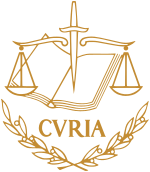General Court (European Union)
Court of Justice of the European UnionEuropean Union lawUse British English from September 2013

The General Court, informally known as the European General Court (EGC), is a constituent court of the Court of Justice of the European Union. It hears actions taken against the institutions of the European Union by individuals and member states, although certain matters are reserved for the European Court of Justice. Decisions of the General Court can be appealed to the Court of Justice, but only on a point of law. Prior to the coming into force of the Lisbon Treaty on 1 December 2009, it was known as the Court of First Instance.
Excerpt from the Wikipedia article General Court (European Union) (License: CC BY-SA 3.0, Authors, Images).General Court (European Union)
Rue du Fort Niedergrünewald, Luxembourg Kirchberg
Geographical coordinates (GPS) Address Nearby Places Show on map
Geographical coordinates (GPS)
| Latitude | Longitude |
|---|---|
| N 49.621 ° | E 6.1431 ° |
Address
Sofitel Luxembourg Europe
Rue du Fort Niedergrünewald 4
2226 Luxembourg, Kirchberg
Luxembourg
Open on Google Maps










